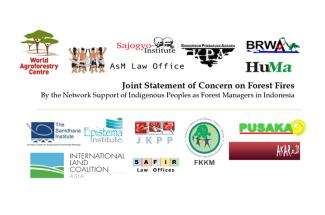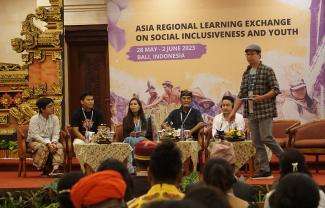by the Network Support of Indigenous Peoples as Forest Managers in Indonesia
For hundreds of years, indigenous peoples have implemented good forest and land management cycles in peatlands in Indonesia generating food and protecting the environment, including the controlled use of fire.
A general prohibition against the use of fire will not solve the haze problem and will negatively impact millions of small farmers and communities.
The unprecedented forest and peatland fires over the past several months have been a disaster for Indonesian economy and its international image and have caused massive suffering for millions of Indonesian and people across the ASEAN region. The urgency of the situation resulting in 19 deaths and half a million people suffering from respiratory illness related to the smoke requires an informed response, not a kneejerk reaction that will ultimately not solve the problem.
A consequence arising from the haze has been the concerted effort to shift blame for the extensive fires to indigenous peoples and smallholder farmers. However by examining satellite imagery and the resulting maps of ongoing forest fires it is clear that vast areas of peatlands and forests are burning within forest concessions areas granted to large and small companies. It also shows that indigenous peoples forests have evaded the fires. This corroborates existing scientific understanding, backed by strong evidence, that draining peatlands for industrial palm oil or paper/pulp plantations is the major driver of these uncontrollable fires.
This stark reality requires an appropriate response from the Indonesian government; one that seeks to ensure law enforcement, accountability from those responsible for issuing permits to concessions in peat lands, and from the companies themselves who caused the devastation. This also calls for empowerment of indigenous peoples and local communities who can assist in finding solutions for sustainable management of peat lands.
Indonesia, Southeast Asia, and the world are seeing the results of company practices that use fire as a means to clear land for plantations while simultaneously deliberately draining sensitive peatlands. It is important to note that local farmers do not have the resources to dig drainage channels, unlike big companies. They plant in mixed agroforestry systems, and use regulated fire systems to control weeds and enrich the soil informed by the traditional practices of fire control.
Controlled fire use has a legitimate place in these small scale mixed agroforestry systems or gardens. Indigenous peoples and local communities are the victims, not the cause. A general prohibition of fires would be misguided and negatively impact small farmers and indigenous people, decreasing their productivity levels, and affecting food security and incomes. Nuanced understanding is needed now, for an effective policy response.
Fortunately, the solution is already available. For hundreds of years, millions of indigenous communities lived on and depended directly on Indonesia's peatland forests for their survival. These sensitive lands were managed through documented diverse traditional systems such as tembawang, simpukung, community forest systems among others.
In these areas, local communities have protected the forests and developed suitable agriculture around its boundaries, farming and fishery activities, and vegetable planting during dry seasons, with rice and fish cultivation during wet seasons. These mixed systems also include livestock such as buffalos and cows, along with planting trees and perennials like rubber and coconut. However, due to insecure tenure and overlapping concessions and permits granted to companies in these areas, these traditional systems and their land have come under great stress and vulnerability.
While the fires continue to burn, we should not let the haze impede our ability to see the right path forward. Ensuring tenure rights to local communities will provide them the incentives and secure grounds for sustainable management of precious peatland and forests. This offers an alternative model to industrial agriculture and plantations that will not only effectively prevent future uncontrolled fires, but will contribute to securing food sovereignty, bolstering the local economy, and mitigating climate change.




